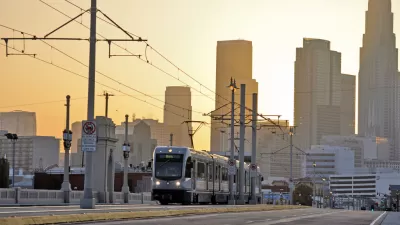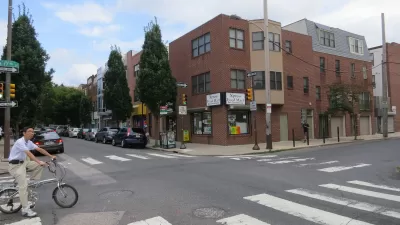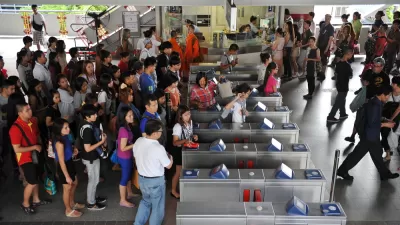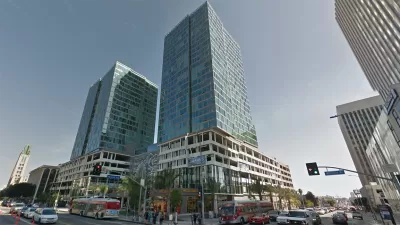Architecture critic Christopher Hawthorne describes an L.A. in flux, at once beholden to its postwar image and pushing in a new direction. The city, he says, faces existential questions on a scale unmatched elsewhere in the nation.

In an interview, Christopher Hawthorne discusses why L.A. may be entering its third great incarnation. "All of us continue to be disappointed by how much of the reading of L.A. just assumes that the city started in 1930 or 1945 [...] Southern California was really built around the convenient marriage between streetcar lines and real estate speculation. That laid down the network on top of which the freeways were built."
After post-WWII suburbanization replaced an older car-less Los Angeles, today's push for public infrastructure is both reversal and revolution. Hawthorne remarks, "An easy way to think about what's happening is there was a time when nine out of every ten changes to a boulevard in L.A. were done with the idea of drivers in mind. Parking lots were added, sidewalks shrunk, buildings were destroyed along boulevards. Now the opposite is true; the vast majority of changes to boulevards are in favor of a balanced street."
Following an era suited to the individual, the city is considering its collective ambitions. "A lot of the basic ways in which the city defines itself are up for grabs in a way that's not true in any other major American city that I can think of. It's not true in San Francisco, New York, or Chicago. Those cities are in many ways fixed. In L.A., existential questions are still up for grabs."
L.A.'s "third era" may well include architectural rediscovery in the public space. Hawthorne says, "[L.A. has] become a very constrained, regulated, and risk-averse place in terms of new architecture. That's still surprising for people outside of L.A. to hear [...] We do have a great history of public space and civic architecture that we lost sight of."
FULL STORY: Q+A> Christopher Hawthorne: Christopher Hawthorne makes the case for a post-suburban city

Planetizen Federal Action Tracker
A weekly monitor of how Trump’s orders and actions are impacting planners and planning in America.

Map: Where Senate Republicans Want to Sell Your Public Lands
For public land advocates, the Senate Republicans’ proposal to sell millions of acres of public land in the West is “the biggest fight of their careers.”

Restaurant Patios Were a Pandemic Win — Why Were They so Hard to Keep?
Social distancing requirements and changes in travel patterns prompted cities to pilot new uses for street and sidewalk space. Then it got complicated.

Platform Pilsner: Vancouver Transit Agency Releases... a Beer?
TransLink will receive a portion of every sale of the four-pack.

Toronto Weighs Cheaper Transit, Parking Hikes for Major Events
Special event rates would take effect during large festivals, sports games and concerts to ‘discourage driving, manage congestion and free up space for transit.”

Berlin to Consider Car-Free Zone Larger Than Manhattan
The area bound by the 22-mile Ringbahn would still allow 12 uses of a private automobile per year per person, and several other exemptions.
Urban Design for Planners 1: Software Tools
This six-course series explores essential urban design concepts using open source software and equips planners with the tools they need to participate fully in the urban design process.
Planning for Universal Design
Learn the tools for implementing Universal Design in planning regulations.
Heyer Gruel & Associates PA
JM Goldson LLC
Custer County Colorado
City of Camden Redevelopment Agency
City of Astoria
Transportation Research & Education Center (TREC) at Portland State University
Camden Redevelopment Agency
City of Claremont
Municipality of Princeton (NJ)





























